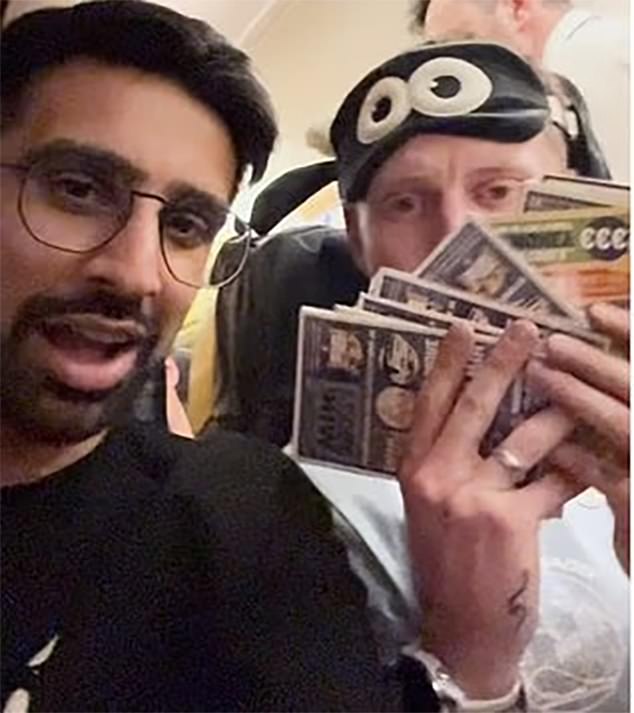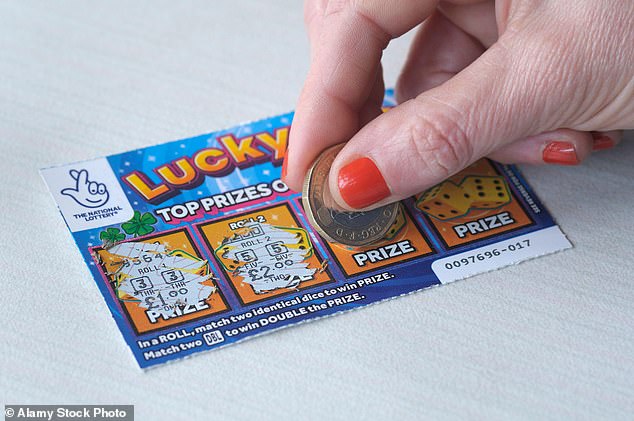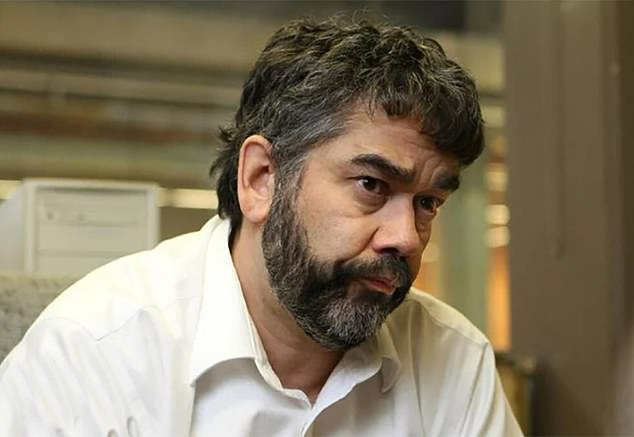Hundreds of millions of scratchcards are sold every year – with jackpots typically varying from £100 up to £1million.
Although budget airlines and others, such as fundraisers, issue cards, by far the biggest provider is the National Lottery, which currently sells 52 different types.
Undeterred by discovering you are probably more likely to be struck by lightning than win a major jackpot, Toby Walne spoke to scratchcard experts to find out the truth behind popular myths and get tips on how to increase your chances.
Remember, scratchcards are dressed up as a fun way to have a flutter – but it is still gambling. If you start getting addicted and begin spending money you need, then you must stop and consider seeking help.
Discover the best jackpot odds
What are the odds of hitting the jackpot with a scratchcard? Just ask Ryanair passenger Evan Payne who recently bought every single card on a flight and ended up empty handed: ‘Not one winner – a grand total of zero.’
Payne bought all 68 scratchcard packs available, at a cost of €2 each last month, with YouTuber Vikram Singh Barn filming the stunt for social media.
Even if Payne had won it would only have put him into an annual draw where you must pick from 125 envelopes to win from €100,000 to €1million.
Will Love, 29, who studies scratchcard winning odds and runs the website smartscratchcard.co.uk, is far from surprised that Payne left the plane with no prizes – and would have been far more shocked had he won.
Love has done the number-crunching on the chances of winning from a wide range of scratchcards. He says: ‘The biggest shock is that in many cases the jackpot has already been won, so the odds of winning a jackpot can sometimes be zero.
‘While no new scratchcards for a game might be printed once jackpots have been claimed, those already displayed can be sold until an official card closure date.’
Love has trawled through data to evaluate odds of winning prizes and if jackpots have been claimed. His latest research has found the best odds for winning a jackpot are one in 1,426 for the £500 Loaded draw at £5 a ticket.
Just under 500 of these modest top prizes are still available. Some 15million of the cards have been issued since April last year and less than 10 per cent are still for sale.

Ryanair passenger Evan Payne, right, recently bought every single card on a flight and ended up empty handed, with YouTuber Vikram Singh Barn filming the stunt for social media
For those dreaming of a much bigger prize, the odds get much longer.
Love believes those wanting the kind of win you could retire on might opt for a Run For Your Money scratchcard at £5, issued in March this year, where two out of the three £1million jackpots are still up for grabs.
He has calculated there is a one in just over 1.6million chance of you buying the jackpot card – the best odds currently available for £1million cards. In comparison, there is a one in 1.1million chance of being struck by lightning in Britain this year.
Elsewhere in big prize money territory, all three jackpots are still available for the £1million Silver & Gold with one in three million odds, all four for the £300,000 Lucky Bonus with one in 2.3million odds, all four for the £1million Mega Cashword with one in 6.7million odds, all four for the £300,000 Cash Match with one in 2.4million odds, all three for the £300,000 Single Double Triple with one in 2.3million odds, and all five for a £100,000 Orange Doubler with one in 7.3million odds.
Look out for jackpots already claimed
Unfortunately, Love has discovered five scratchcard games where currently all the jackpots have already been claimed – though minor prizes can still be picked up.
These include the Set For 5 Years cards with a £300,000 jackpot at £2 a card, the £1million jackpot Mega Cashword at £5 a card, and £10,000 jackpot Good Luck at £1 a card, the £2million Black Pearl at £5 each, and the 777 at £2 each with a top cash prize of £50,000 offered.
Love says: ‘The odds of winning a prize are printed on the back of a scratchcard – but these relate to all cash prizes and not just the jackpot. I have given ratings for different scratchcards. If jackpots have already been claimed, then I am afraid you score nothing.’
Rules approved by the industry regulator the Gambling Commission state new batches of scratchcards cannot be sold for prizes worth £121,000 or more once all the top prizes have been claimed. But this does not stop those already on shop shelves often still being available.
Explore the ‘Singleton Method’ for scratching
Most scratchcards have a mix of numbers and symbols – some of which you can see when buying the card and others you must scratch off to view.
According to Canadian statistician Mohan Srivastava, who devised the Singleton Method in 2003, scratchcards where there are only single numbers showing before a card had been scratched are more likely to produce winners. This is compared to those where a combination of two or more of the same numbers are on view.
He believes that the numbers are often laid out in patterns and by studying these patterns and looking for ‘singletons’ you may increase your chance of winning.

Purchasing more scratchcards at once may increase the chance of winning compared to buying a single card, according to one theory
Gambling platform Casino.org says: ‘Companies use algorithms to ensure the correct number of winning cards are produced. If they didn’t then they couldn’t control the number of winning tickets. But the Singleton Method may only work on scratchcards where you scratch off numbers and match them with numbers already shown.’
However, it is important to be aware that scratchcard providers follow a wide variety of different formats and rules to ensure such a simple system does not work. It should be viewed as just a fun part of a guessing game.
Does buying in bulk pay off?
Purchasing more scratchcards at once may increase the chance of winning compared to buying a single card, according to another theory. Is that true or just a recipe for overspending on scratchcards?
Casino.org says: ‘Some believe that if you buy in bulk, the odds of hitting a win increase, since the manufacturers often place a win frequently throughout their scratch-offs. So, if you bulk buy scratchcards in one purchase, the chance of hitting one of those planted winning scratchcards is higher than if you had bought the same number of scratchcards on different shopping trips.’
Social media influencer MasterOv spent £1,000 on scratchcards to discover how easy it was to win by buying in bulk.
He purchased ‘two massive bricks’ of scratchcards – 50 National Lottery £10 cards with three £3million jackpots and 50 other £10 scratchcards that advertised two £4million jackpots.

Mohan Srivastava, who devised the Singleton Method, says scratchcards where there are only single numbers showing before a card had been scratched are more likely to produce winners
The YouTuber won some money but still ended up down substantially.
He said: ‘The final figure that we got was £520 – so we won but also lost £480. We got 25 cards as winners – exactly a quarter of the cards. You definitely do not win more money when you do this.’
Another problem with buying in bulk is it goes against new purchase limit rules introduced last October. A National Lottery spokesman says: ‘You can buy up to ten National Lottery Scratchcards in a single store visit.’
Don’t forget the odds are stacked against you
Calculating the odds of winning and the structure of how prizes are paid out is at the heart of the business strategy for selling scratchcards – and that’s why you should be wary of being dazzled by headline-grabbing jackpot figures.
Casino blog The Dark Room says: ‘In most scratchcards, smaller prizes are more common, while big jackpots are rare. This ensures players feel like they are constantly in the game, winning something regularly even if just a small amount.
‘At the same time, the odds are stacked so that larger prizes remain elusive, keeping the overall game profitable – bringing in a healthy return for the company.’
Casino.org believes that although it might be tempting to opt for cheaper tickets, the prize pool is lower – even if it seems like there are more wins offered. It says: ‘You would be better off buying higher-priced scratch-offs when it comes to finding scratch-off tickets worth buying.’
Read the small print on the scratchcard
It does not matter if you have won the jackpot, unless you read the small print on the back of the card you could still be left empty handed.
You only have 180 days after a National Lottery ‘scratchcard closure date’ to claim a prize. For recent games it has stopped selling, such as releases of Triple Cashword Pink, Lucky Bonus and 5 Years For You, the deadline for a claim to be received is September 1.
The closure date should be on the back of the card, but you should also check out the website link at national-lottery.co.uk/games/gamestore/scratchcards/closures.
Winners can claim up to £100 at the shop where the card was purchased – or £500 at major retailers. Above this amount you must fill in your name and address on the back of the card along with a completed prize claim form for amounts up to £50,000. The cards should be validated at the retailer’s terminal to log the win and the prize due.
For amounts above £50,000 you should call the National Lottery Line on 0333 234 50 50, so arrangements can be made to show the card and receive winnings in person.
Scratchcards found in the street where a name and address has not been filled in can also be claimed – otherwise the money belongs to the owner. It is against the law to buy a card, or claim any win, if aged under 18.
You should also look at the back of the card for the overall odds of winning any prize. Visit national-lottery.co.uk/games/gamestore/scratchcards.












